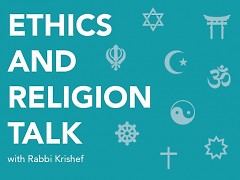Continued from last week: In recent months we have seen reports from Philadelphia of wide spread clergy sexual abuse of children followed by wide spread cover-up also committed by clergy. As a member of the clergy what do you think of your profession weighing in on ethical issues [when it seems unable to police itself]? ~James
Rev. Ray Lanning, a retired minister of the Reformed Presbyterian Church of North America, responds:
“The Roman Catholic Church is paying a heavy price for committing a very human sin in the form of efforts at institutional self-protection. The urge to ‘deep six’ the failings of the clergy is common to all denominations. Ever since Adam and Eve set about sewing fig-leaf aprons, human beings have been trying to hide the evidence of their sins from public view.
“Presbyterian and Reformed churches do not let the clergy police themselves, however. Supervision of the faith and life of Presbyterian ministers is lodged with the presbytery or regional court of the church; in Reformed churches, with the local consistory. The minister is accountable to his fellow office-bearers. In my experience, this system doesn’t work very well. Too many members of consistory or presbytery lack the knowledge and experience needed to make the system work any better than it does. Good intentions cannot compensate for ignorance of church order and proper procedure; to say nothing of the wisdom needed to adjudicate a difficult case.
“But your question seems to assume that the clergy must have their own house in perfect order before they ‘weigh in’ on ethical questions. If that were the standard, we’d have no preachers at all. A wise and faithful preacher sees himself and presents himself to others as a sinner saved by grace. With humility and compassion, he offers his hearers the help he has found helpful in his own case first of all. ‘We preach not ourselves, but Christ Jesus the Lord; and ourselves your servants for Jesus’ sake’ (II Corinthians 4:5).”
Father Michael Nasser, who writes from an Eastern Orthodox Christian perspective and is Pastor of St. Nicholas Orthodox Christian Church, responds:
“One cannot and should not minimize the horrors revealed in the latest revelations of sexual abuse committed by certain members of the clergy, and the equally horrid systematic cover-up which ensued. But to properly find justice we must limit blame to the guilty and not paint the innocent with the same charges.
“Some members of each and every group do not live by the values of the group. While we wish this were not the case--and hope and pray that they are few--there will always be some: some politicians are corrupt, some airline pilots fly drunk, some police are brutal. But these reprehensible actions by a few do not remove the virtue done by the rest. We add to the harm done by the guilty when we paint with such broad strokes as to accuse the innocent of guilt by association, and remove the moral authority we need from them in their respective field.
“Those guilty of clergy sexual abuse have removed their own moral authority. Clergy didn’t do that; abusers who abused their position as clergy did.
“In a world with declining appreciation for morality, we need to preserve moral authority wherever we can.”
My response:
The abuse of one child by one priest is too many. Every member of the clergy should be held responsible if he or she engages in abusive behavior towards children. There should be no hiding behind religious shields. Religious institutions don’t prosecute and punish individuals for crimes against God or crimes against human beings. Because we enjoy the privilege of living under the protection of our government, we cede the authority to bring people to justice to the State, which is, of course, an extension of ourselves (“of the people, by the people, for the people”).
The abuse of one is too many, of one thousand is too many. But is one thousand over a period of about 70 years “wide-spread?” Hundreds of priests were implicated. Out of tens of thousands. Is that widespread? Is it clear that in those decades, the church did a horrible job policing itself, which it should not have been doing in the first place. But this does not mean that adherents of a religious tradition, both clergy and lay-persons, cannot legitimately use sacred texts and traditions to weigh in on ethical issues. That is, after all, the fundamental premise of this column.
The Bible and Rabbinic literature give numerous descriptions of the qualification to be a judge. I submit that these are essential qualities in order to be qualified to act as clergy. The seven fundamental qualities are “wisdom, humility, fear of God, disdain of gain, love of truth, love of people, and a good reputation.” In addition one should be familiar not only with Jewish law and tradition, but also with math and science. One should be gentle in speech, and able to express one’s views in clear and well-chosen words.
This column answers questions of Ethics and Religion by submitting them to a multi-faith panel of spiritual leaders in the Grand Rapids area. We’d love to hear about the ordinary ethical questions that come up on the course of your day as well as any questions of religion that you’ve wondered about. Tell us how you resolved an ethical dilemma and see how members of the Ethics and Religion Talk panel would have handled the same situation. Please send your questions to [email protected].
The Rapidian, a program of the 501(c)3 nonprofit Community Media Center, relies on the community’s support to help cover the cost of training reporters and publishing content.
We need your help.
If each of our readers and content creators who values this community platform help support its creation and maintenance, The Rapidian can continue to educate and facilitate a conversation around issues for years to come.
Please support The Rapidian and make a contribution today.
